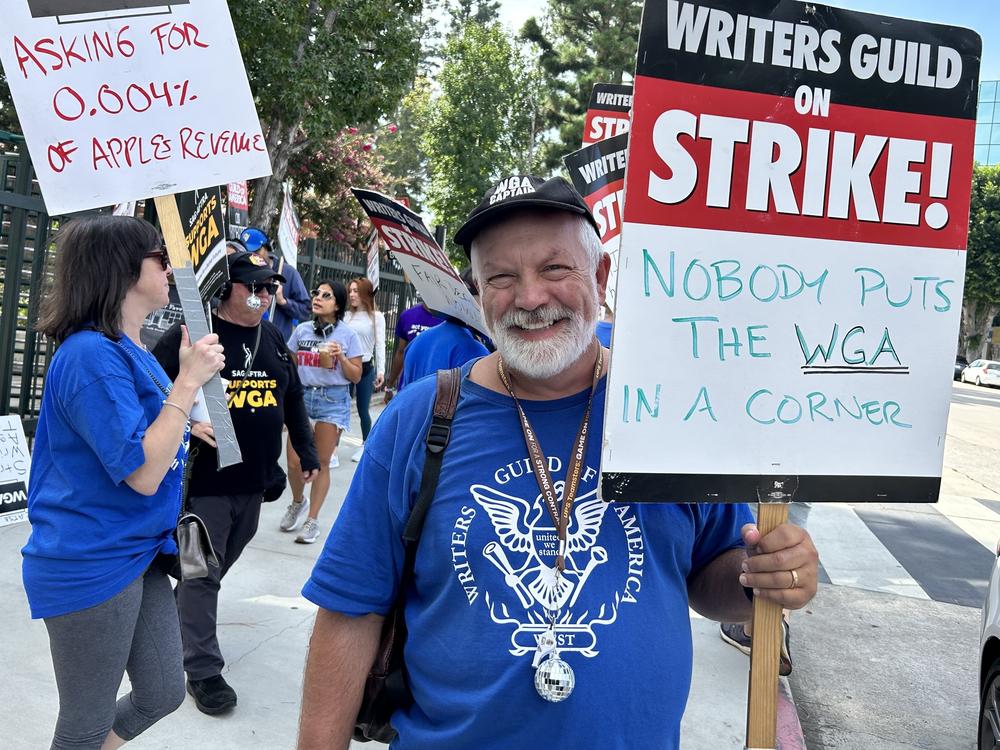Section Branding
Header Content
Three things to know about the Hollywood Writers' tentative agreement
Primary Content
Screenwriters and major Hollywood studios have finally hammered out a new three year contract; now the Writers Guild of America's leadership must vote to pass the tentative agreement on to its 11,500 members for ratification before their 5-month strike can officially end. The leadership's vote is tentatively scheduled for Tuesday. So is this a victory for the writers? We answer a few burning questions below.
1. What's in the deal?
The short answer is that we don't know yet — the WGA says it will provide members with a summary of the deal points after leadership votes to pass it on. But if the mood of the WGA negotiators is any indication, it's good news for the writers.
Immediately after the deal was jointly announced by the Writers Guild of America and the Alliance of Motion Picture and Television Producers, writers began celebrating and cheering for their negotiating team. The WGA sent an email to members, calling the agreement "exceptional — with meaningful gains and protections for writers."
The exact details weren't immediately available — "we cannot do that until the last 'i' is dotted," the message read, "What remains now is for our staff to make sure everything we have agreed to is codified in final contract language."
What we do know is that the writers had been asking the studios for higher wages and higher residuals tied to the success of shows rerun on streaming platforms. The negotiators wrestled over the minimum number of writers on every TV show and language to protecting writers' work and credits from being replaced by artificial intelligence.
2. Actors are still on strike, right? How does this affect them?
They are. SAG-AFTRA, the union that represents Hollywood actors, congratulated the WGA, noting its members' "incredible strength, resiliency and solidarity on the picket lines. While we look forward to reviewing the WGA and AMPTP's tentative agreement, we remain committed to achieving the necessary terms for our members."
Screenwriters were asked to continue supporting actors on the picket lines, and many said they hope the WGA deal will set the framework for SAG-AFTRA, as well as other Hollywood workers whose unions will be negotiating their new contracts.
There is some hope that, after their vote on the agreement, WGA leadership will clarify the many questions over what is permissible for their members — particularly, if writers' ratify their new agreement before the actors end their strike. For example, will WGA members be allowed to cross SAG picket lines? Can they go back to work if they connect remotely or at places which are not being picketed by the actors' union?
Hollywood directors, represented by the Directors Guild, hammered out their own new contract earlier this summer.
3. Will production start up again? What does this mean for my favorite show coming back?
While some independent productions have been going during the double strikes, major scripted Hollywood productions won't resume until the WGA and SAG- AFTRA finalize their deals with the studios.
So far, neither the WGA or SAG-AFTRA have released statements on a specific timetable for a return to production. Across the industry, there seems to be hope that daytime and late night TV talk shows could return soon, because their hosts are covered by a different agreement than the one the actors' guild is currently striking over. However, performers from major TV shows and films likely would not appear on talk shows to promote those projects until the actors' strike is resolved.
The trade magazine Variety published a story saying producers on some late night shows hope to come back soon as next week. In their note to members about the tentative agreement, the WGA negotiating committee says the guild leadership may vote to end the strike while the effort is underway to ratify the new agreement with the entire membership — which would theoretically allow writers to return to work as soon as possible.
Copyright 2023 NPR. To see more, visit https://www.npr.org.

